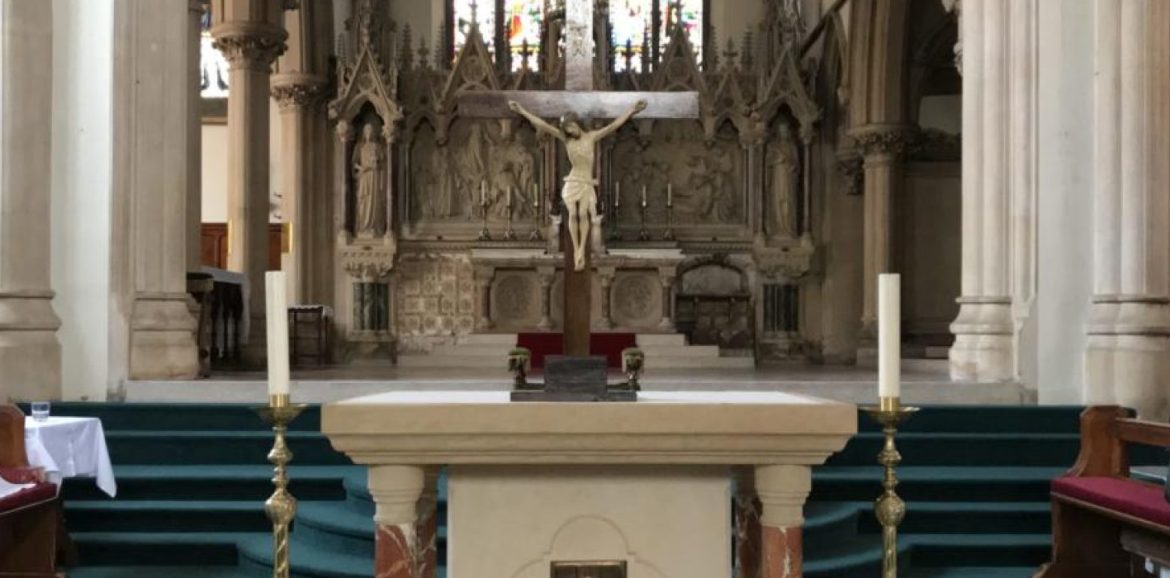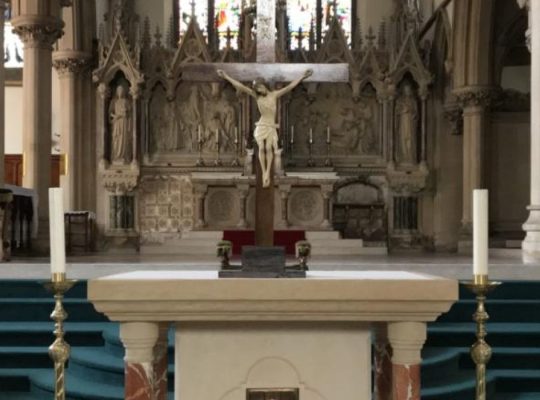Into the framework of the ‘journey to Jerusalem’, Luke has incorporated certain teachings of Jesus that function as steps in Christian catechesis. In the gospel of the Eighteenth Sunday, we saw how futile it was to hoard treasure here in this life —and the Nineteenth Sunday how we must behave like a faithful and prudent steward waiting for his master’s return. Today, we see how such conduct and behaviour contrast sharply with the world’s way of acting, often leading to conflict with those who do not appreciate all the things and the behaviour needed to attain the kingdom of heaven. It is important though, that throughout all the conflicts and hardships that one is assured of being on the right path, and in some measure already possessing the treasure for which one hopes, being able to see—through faith—invisible realities. Faithful vigilance in the service of the Lord who has come and will come again can nevertheless lead to distressing situations and painful, or even tragic choices.
The first reading this Sunday tells of one of those tragic episodes in which the life of Jeremiah abounded.
Clearly, it has not been chosen because of its status as a mishap occurring to a famous biblical person, one that did not end up too badly. With the passage of time, this episode, sad though it is, seems to have become a mere historical anecdote of little interest. There are so many similar and worse stories that appear in the history of every nation, even today!
All this is true. But the reading is part of the montage of the Liturgy of the Word and, as we know, it has been selected with respect to the Gospel of the day, which must determine our manner of receiving, listening to, and understanding it.
Jeremiah certainly belongs to the past (Six centuries before our era). But his message interests us, punctuated so often as it is by: ‘This word of the Lord’ or ‘Thus says the Lord.’ Moreover, Jeremiah is, according to Christian tradition, one of the most striking figures of Christ.
Called to be, like Jesus, a herald of the covenant and the promise — ‘I will be your God, and you will be my people’ — Jeremiah knows it was never said: ‘I will be your God and you will be my people, exclusively,’ and still less: ‘without taking account of your conduct.’ This is a constant theme of Prophets. They never cease recalling, both at convenient and inconvenient times, in no soft-spoken terms, that not only do the privileges of the covenant lead to moral obligations, but the very fulfilment of the promises always depends on the faithfulness of the people to the precepts and commandments of their God.
Jesus was accused of misleading the people, Jeremiah of ‘demoralizing the soldiers who were left in the city,’ of seeking ‘not the welfare of the people, but their ruin. Both were arraigned before the holder of judicial power—Zedekiah, in Jeremiah’s case and Pilate in Jesus’ —Both unable to offer opposition to the demand for the maximum penalty, and who handed them over to their accusers.
Jeremiah’s innocence, like Jesus’, was recognized by a pagan: the Ethiopian
Ebed-Melech, and at the crucifixion of Jesus, a Roman centurion.
The intervention of a place officer saved Jeremiah from death. Jesus died but was raised by God.
In reading through the text of the first reading for this Sunday, how can we not recognise Jeremiah as a figure of Christ, and indeed of all the Christian faithful, especially martyrs and persecuted missionaries?
A prophet is always, in one way or another, a ‘sign of contradiction’ to the people. Fidelity to the Word and his mission expose him to the misunderstanding of his neighbour’s, often to mistreatment, sometimes even to death. The ‘confessions of Jeremiah’ testify to this. The prophet willingly runs the risk of exposing himself to the dangers. This is what makes him a witness, a martyr. If thus it falls to him, he remains unshaken, secure in his faith with utmost confidence in the help of God who will never fail him, knowing that he will emerge victoriously from the trial.
This reading prepares us to receive the proclamation of today’s Gospel. ‘I have come to set the earth on fire, and how I wish it were already blazing!’
It is rather rare in the Gospels that Jesus speaks of himself in the first person: ‘I have come…..I wish….I must’ These are very involved sayings, through which Jesus not only reveals his mission but also expresses with full awareness his determination to fulfil them.
But what is this ‘Fire’ which he has come to light upon the earth, which he wishes were already kindled? Surely, not that of the divisions of which he will speak later on; Jesus clearly does not wish to willingly inspire them. And it is certainly not that of the judgement at the end of time, as it is spoken of in the prophets and the apocalyptic literature. Luke definitely wants to guard against the expectation of an imminent last day, which he would not have done if he found testimony to the contrary in Jesus.
On the other hand, in his account of Pentecost, Luke evokes the Spirit under the form of fire, and his gift as the fulfilment of the prophecy of what must come to be realized in the last days as the goal of Jesus’ whole mission. ‘God raised this Jesus; of this we are all witnesses. Exalted at the right hand of God, he received the promise of the Holy Spirit from the Father and poured it forth, as you [both] see and hear.’
Therefore, Jesus reveals himself with the ardent longings to illuminate the world by the fire of the Spirit, which is the ultimate goal of his work. Such a look into Jesus’ mind is worth more than the Gospels would indicate.
Against this fire, is set the fire of the baptism that Jesus must receive, for which it’s painful for him to wait. This baptism has the sound of a test; it seems to be preliminary to the lighting of the fire. Mustn’t we recognise in this image the passion of the Saviour? Jesus spoke in a similar way with respect to his day and his glory: ‘For just as lightning flashes and lights up the sky from one side to the other, so will the Son of Man be [in his day]. But first he must suffer greatly and be rejected by this generation’; ‘Was it not necessary that the Messiah should suffer these things and enter into his glory?’
When speaking of ‘baptism,’ Luke certainly cannot help thinking of the Christians of his time, just as we spontaneously think of the first of the sacraments of Christian initiation. This ‘baptismal bath’ is in fact linked to the gift of the Spirit which everyone receives through the washing of baptism. We are baptized into the death of Christ so that we can share in his resurrection.
But the baptism that Jesus must receive has an important place in his life and mission: ‘What anguish I feel until it is over!’ Is this to say that the thought of it causes him worry or anguish? Rather, Jesus is expressing his desire to come to the end (or goal) of his mission. This then is the goal of the mission that Jesus wants to accomplish and toward which he moves, by resolutely following the road to Jerusalem: to engulf the earth with the fire of the Spirit after having received the baptism of his passion.
This will bring consequences for his followers. ‘Do not think that I have come to establish peace on the earth? No, I tell you, but rather division.’
It is hard not to be astonished or taken back every time we hear this abrupt proclamation. We prefer to think instead of the prayer before holy communion: ‘Lord Jesus Christ, you said to your apostles Peace I leave you, my peace I give to you. Look not on our sins, but on the faith of your Church; and grant us the peace and unity of your kingdom, where you live forever and ever.’ But everyone has the God given gift of free will. We must all choose which road to take, and if that road is different to someone else’s who doesn’t want to follow the master then it will cause enmity.
We know that Jesus said that his peace is not given ‘as the world gives peace’, which is based on compromises, concessions, and bargaining, amounting to a balance of powers. No, his peace, even though it is not of this world, is still what we dream about: ‘A peace the world cannot give.’ This is his gift to us. And so, it is peace that is at issue here, not division. How so?
The difference is crucial. To welcome the peace of the kingdom which Jesus gives and which is only attained through the cross, places believers in a situation where they are sometimes set in conflict with others. For this peace rests on faith, the choice for Christ and the kingdom, which necessarily involves detachment from, if not rejection of, all that is opposed to Christ and his Gospel or that is incompatible with the choice one makes for it. Here he proclaims division even within a family: ‘from now on,’ since he is here and the choice must be made now— for or against him.
It is easy to say or think: The way to a peaceful life is to direct oneself, today to the Gospel!’ ‘Peaceful’ perhaps, but at the price of the peace of the kingdom, the peace given by Christ. And it is because one is aware of this the one ends up desiring division instead.
Every human life is confronted, at some point or another, with choices that in some instances demand real heroism. The situation becomes particularly distressing when one finds oneself torn between faithfulness to God, faith, and the gospel, and on the other hand, to family, friends, and country. There is a great temptation to retreat into one’s own corner, refusing to choose a side or take a stand on anything. But we must firmly fix our eyes on him, the beginning and the end of faith for those who have received the Spirit through baptism into his death and resurrection. He makes it possible to run ‘the race strongly, which leads to participation in his glory.’
‘My sheep hear my voice, says the Lord, and I know them, and they follow me.’


